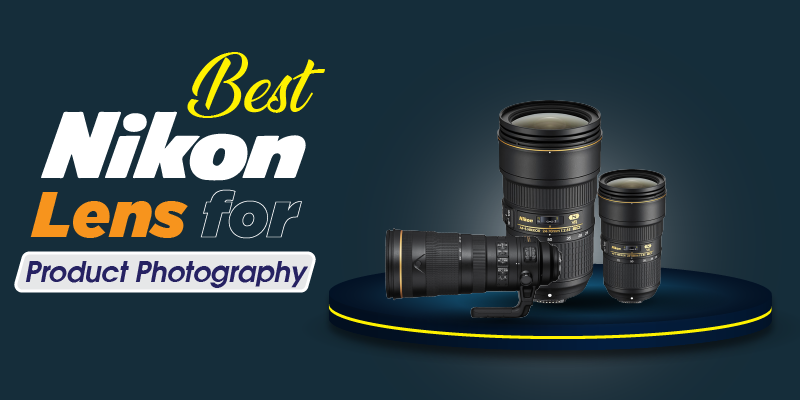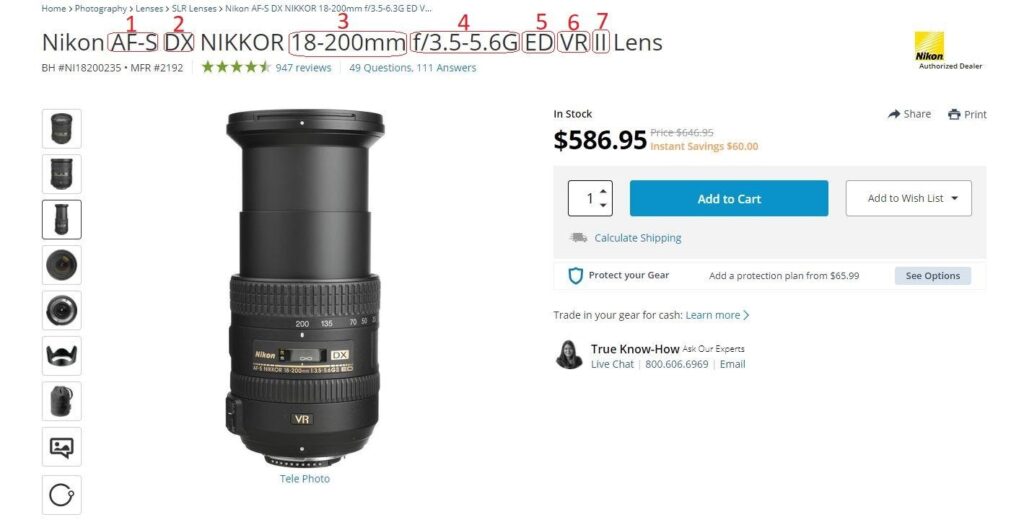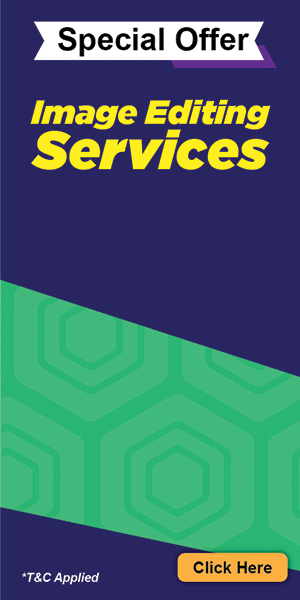
Best Nikon Lens For Product Photography
When you purchase through links on our site, we may earn an affiliate commission. Learn More
Being a Nikon camera user finding the best Nikon lens for product photography is like a magic wand.
Camera lenses are tough to get along with if you choose the wrong one. It can even destroy your photography career for good. You can’t use any lenses with any camera and expect extraordinary output.
You must purchase your camera and lenses based on the subject or scene you are going to capture. But finding the best Nikon lenses for beginners is not an easy task.
So today, in this editorial, we will dig into some of the best Nikon camera lenses in 2021 that you can use for your product photography, even if you are a beginner.
Table of Contents
Toggle7 Best Nikon Lens For Product Photography
Nikon 50mm f/1.8G AF-S NIKKOR
If you are looking for the best value for money experience and the budget is in the bottom category, then Nikon prime lens 50mm is the best option.
I can talk for hours in the Nikon AF-s Nikkor 50mm f/1.8g lens review, but the list of features and results this lens offers won’t get shorter any time soon.
The key features of this lens are f-mount lens/fx format, aperture range f/1.8 to f/16, super integrated coating, silent wave motor A.F. system, and rounded 7-blade diaphragm.
Having the ability to be compatible even with the canon APS-C/1.6x FOVCF, the Nikon prime lens 50mm is lightweight and offers an economical cost with a telephoto zoom capability.
Moreover, despite being the price of its main selling USP, the lens can produce pretty sharp images, which are best for product photography.
Pros:
- Good Optics
- Bokeh Has Softer Edges And A Less Geometric Shape
- Light, Cheap, Sharp, And Fast
- Quick Focusing Ability
- Captures Clean, Defined, And Colorful Even In The Indoors.
- Much Higher Shutter Speed
Cons:
- It feels a bit flimsy (but also lighter)
- Slightly Slow In Responding In Auto Focus
Nikon 55-200mm f/4-5.6G
Getting every shot perfect is like a dream for photographers, which is almost impossible in reality.
But with Nikon AF-S DX 55-200mm f/4-5.6G E.D. VR II, you can shoot at your best with fewer shots possible because of its variable aperture telephoto zooming capability.
Photographers using the Nikon APS-C DSLRs such as the D5300 or D3300 can use this lens as well.
It provides the versatility of shooting from a distance to different subjects such as portraits, sports, and even wildlife to its users.
So if you are thinking of using a Nikon 55-200mm lens for portraits, you can get along immediately as you will get the best in the business.
The Nikon 55-200mm f/4-5.6 II adds image stabilization (V.R.) and full-time manual focus override that was lacking in its predecessor, launched in 2005.
Moreover, with the help of its new 4-stop V.R. system, you can shoot sharper images with slower shutter speeds.
To get an idea of how good the lens works, check out the 55-200mm Nikon lens sample pictures from the link.
Pros:
- Best For Long Distance Shoot
- Fast And Quiet Autofocus
- Lightweight For A Telephoto Lens
- Product Great Color And Contrast
- Take Great Bokeh Effect Pictures
Cons:
- Very Lightweight And Flimsy
- Cheap Plastic Build
Nikon AF-S DX Micro-NIKKOR 40mm f/2.8G
It is one of the best Nikon dx prime lenses to shoot jewellery products.
Nikon Af-s Dx Micro-Nikkor 40mm F/2.8g is a lightweight and compact design wide-angle lens that allows photographers to capture every detail of a jewellery product.
However, keeping the focus on every bit of a jewellery product is a tough job, especially when you have the wrong equipment, such as lenses.
Because of its 1:1 shooting scale and minimal focal distance, Nikon Af-s Dx Micro-Nikkor 40mm F/2.8g is best for close-up shots.
In addition, its CRC and SWM feature allows photographers to capture Sharp and detailed images.
Pros:
- The maximum ratio is 1:1
- Compact, lightweight, and portable
- Perfect picture sharpness when the aperture is open
- Low chromatic aberration
- Great for bokeh photography
Cons:
- Slow autofocus mechanism
Nikon AF FX NIKKOR 85mm f/1.8G Fixed Lens
If you are searching for an ideal and best 85mm lens for Nikon, this 85mm lens from NIKKOR would be a perfect pick.
Its medium telephoto focal length allows food and product photographers to capture stunning photos.
Moreover, with the newly added silent A.F. internal focus system in the latest version, now you will get a more crystal clear shot of your product.
Nikon 85mm lens shines even in low light photography because of its f/1.8 maximum aperture, which is the fastest for the category.
With the best suited Nikon DSLR camera, this lens can produce colourful, detailed images of products and food photography.
For beginners Nikon 85mm f/1.8G lens will work as a blessing because of the detail capturing capability.
Pros:
- Capture Depth Of Field And Available Light Both
- Great Lens For Product And Food Photography
- The Sharp And High-quality Lens
- Fast Shutter To Stop Motion
- Af Is Fast And Accurate
Cons:
- Poor Chromatic Aberrations
- Build Is A Little Bit Cheap
Nikon Af-s Nikkor 35mm F/1.8g ED
To capture the best product photo, Moreover, a lens must have flawless bokeh effect capability.
The Nikon Af-s Nikkor 35mm F/1.8g E.D. lens can isolate the subject from its background sharply in a frame.
It makes the lens perfect for product photography and can offer some dramatic effect while isolating the subject.
The fast f/1.8 aperture allows photographers to create the background blur and soft.
The Nikon prime lens 35mm is a lightweight but handy piece of gear that also offers an ultrasonic type A.F. motor with full-time manual focusing.
The lens comes with a five-year Nikon USA warranty, allowing photographers to use this lens roughly without any fear.
It even shines in the low-light environment and lets you click beautiful images. It is best to fit with DX and F.X. in DX crop mode formats.
Pros:
- Excellent Optical Quality
- Provide Value For Money Experience
- Versatile
- Great Focal Length For Everyday Family Shots
- Capture Fast, Sharp Images
- Silent Wave Motor Af System
Cons:
- Low Built Quality
- Manual Focus Ring Makes Some Sound.
Nikon AF-S DX 18-200mm f/3.5-5.6G ED VR II
It is one of the best Nikon dx lenses for professional photographers, especially those who like to grab their camera and start capturing right away.
The Nikon AF-s dx 18-200mm f/3.5-5.6g ed VR II is a perfect optical lens to shoot in any photography opportunities and situations.
Its powerful 11x zoom helps you to capture stunning wide-angle food photos. Moreover, to stabilize every snap and make it clear, the Nikon AF-s dx 18-200mm lens has vibration reduction technology built-in.
Apart from this, the lens also offers some valuable features such as three aspherical and two ed elements, a silent wave motor A.F. system, and a rounded 7-blade circular diaphragm.
Pros:
- Great Lens For Pro Photographers
- Excellent All-around Zoom Lens
- Provide Adequate Sharpness
- Capture Great Long Shots
- Very Lightweight And Well-balanced
- Versatile Shooting
Cons:
- Makes Loud Noise When Focusing
- Auto-focus Jams, Noticeable Vignetting
It is one of those great creations from Nikon that has a groundbreaking combination of compact design, lightweight feel in hand, and long-range zoom in and out capability.
It’s a fixed lens from telephoto to the super-telephoto range that helps shoot products from far or close distance.
The Nikon AF-p Nikkor 70-300mm f/4.5-5.6e ed V.R. f/34-8 fixed lens has a fast and quiet autofocusing that helps photographers capture immediate action and video recording.
The vibration reduction technology gives you a smooth camera handling experience.
The lens has a zoom ring built-in that provides optimal torque, which results in smooth zooming from first to last.
Furthermore, to capture in a harsh environment, the lens offers dust and water-resistant ability out of the box.
After analyzing a couple of Nikon 70-300mm lens reviews from professional photographers, I found this lens to be the best budget camera lens.
Pros:
- Vibration Reduction Technology
- Stepping Motor
- Super Integrated Coating
- Internal Focus
- Focal Length Range: 70-300mm
- Zoom Ratio: 4.3x
Cons:
- Lose Focus When You Turn It Off
- Do Not Look For Sharpness In The Corners
- Needs Decent Lighting
How To Choose The Perfect Lens For Product Photography
We, product photographers, know how important a camera lens is to capture a perfect photo. But we must consider the type of shooting we will do and the technical characteristics our selected genre has before purchasing our camera lens.
According to some famous product photographers, the macro lens is the best lens for product photography, and with my experience, I can’t agree more.
The photographers of product photography need to showcase every detail of a product. And only a professional macro lens can pull up these product’s close shots.
The range of a macro lens can be 1:1 scale which is perfect for shooting clear product images. Check out the following metrics to know how to choose the ideal lens for product photography.
Focal Length
To choose the best lens for your product photography, selecting the right focal length is essential.
Focal length number determines how close you can go to a subject while shooting it.
So depending on the product, you are shooting and the distance you need to maintain, determine the focal length you should use and then purchase the lens.
Quality of Lens
The lens you are going to purchase doesn’t always need to be of premium built quality. If you are a beginner, you should go for a budget-friendly option.
It won’t offer you a higher standard in quality, but it will offer a value for money experience. A premium quality lens is expensive, and moreover, you won’t be able to use it roughly.
Budget Models
The technology of making photography equipment is growing so fast. It is offering its blessing in every segment of photography.
So you will find a decent product photography lens at an affordable price. Makers are now offering budget-friendly camera lenses that can shoot great product images.
Nikon Lens Guide: Decoding Nikon Lens Names
The name of the camera lenses is quite confusing if you don’t know what they mean. For professional photographers, it is essential to understand the meaning of the name of a lens. Why?
Because it provides a complete configuration and features of a lens. So let’s break down the name first. See the below image to know the breakdown process.

We have used numeric numbers to make our breakdown easy. Let’s know which number tells us what…
- Af-S: Auto-Focus with built-in Silent Wave Motor.
- DX: It represents that the lens is made for a crop sensor (APS-C) camera sensor.
- 18-200mm: It means the focal range of a lens.
- f/3.2-5.6G: The f/3.5-5.6 tells you the maximum aperture range of the lens, and the “G” tells us that the lens does not include an aperture ring.
- E.D.: Extra-low Dispersion.
- V.R.: Vibration Reduction.
- II: A second generation lens
What lens is best for product photography?
Ans: For product photography or still life photography, close-up shots are the most used angle by the photographers. Close-up shots help the subject to get in focused and highlight the major features by showing every detail. So “Macro Lens” is the best lens for product photography.
What is the best aperture for product photography?
Ans: The higher the aperture is, the more focus scene you will get. For product photography, capturing every detail is essential and so use lenses that offer higher aperture. Usually, f/4.1 to f/7.1 performs best in product photography.
Which Nikon lens is best for product photography?
Ans: The Nikon lenses list I have presented above are all best for product photography. You can choose one depending on your budget and requirements. I will suggest you go for a higher aperture lens and, of course, check the Nikon lens compatibility chart before buying one.
Which Nikon cameras have built in focus motor?
Ans: The models of Nikon DSLR camera that has built-in focus motor are D70, D70s, D80, D90, D100, D200, D300, D300s, D700, D7000 series, D500, D610, D600, D750, D810, D1-series, D2-series, D3-series, D4-series, D5 models1. These DSLRs can utilize both A.F. and AF-S lenses.
Which Nikon lenses have autofocus motor?
Ans: Two types of Nikon lens series have autofocus moto built-in, AF-S lenses and AF-P lenses. So if you want this feature in your lens, then see the lens name to know if it has it or not. If you don’t know how to decode lens names, read the “Nikon Lens Guide” portion of this article to know how to decode lens names.

Bordie Capron
Author
“Bordie Capron is a Sr. Content Maker who is working in The Clipping Path Service an US-based image and video post-production company for over 7+ years. She completed her degree in graphic designing and worked as a graphic designing expert for several years. She always loved writing”
Categories
- Image Guidelines (12)
- Post Production (8)
- Pre Production (27)
- Review (16)
- Tips (51)
- Tutorial (18)
Recent Posts
Quick Response
Email:
cs@theclippingpathservice.com
Hotline Support:
Mobile: +1 (718) 717-2362









No Comments